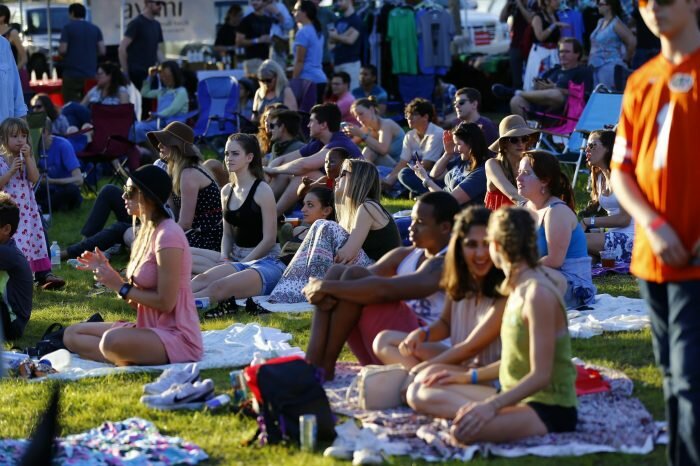Rachel Barton Pine: From Baroque to Heavy Metal

Rachel Barton Pine’s visit to Gainesville earlier this March was reason enough to geek out if you fall into any classical music circle. With a musical tone crisp enough to cut sheet metal, a travel schedule that takes her to concert halls over the world and a foundation that helps underprivileged and extremely talented children launch their music careers, she is one of the great violinists of our time.
She played all of Bach’s Partitas and Sonatas from memory, a program that only a few other violinists on Earth can manage. There was something otherworldly about her, an expression of pure bliss framed in-between the spill of stage lights thrown across the curtain.
The concert was nearly three and a half hours long but she still visited with audience members afterward, down to the wide-eyed violinist at the end of the line asking for a selfie with her. Admittedly, I was that person.
Days after the Bach concert, she concluded her week in Gainesville with another concert and a completely different, polished program.
With a discography of 30 CD’s, this is only where her repertoire begins. I talked more with her about her life as an artist.

“I do carefully paced practice, never less than a few hours a day,” Pine said.
She describes her regiment as athletic: sticking to a strict diet of unprocessed foods, getting plenty of rest and gradually building up to a program.
She says she has to be even more disciplined with her practice time as her daughter has started practicing an hour a day. Her daughter and husband tour with her.
“I feel blessed. Some people have to have marriages over Skype or come back home a lot. I haven’t had to compromise. Each time we’re in a hotel, that’s our home for the week.”
Hearing the violin at St. Pauls church in Chicago inspired her to ask for a violin as a child. By the age of five, and already with a year or so of music experience, she knew playing violin was, “meant to be; the core of my identity.”
Returning to St Pauls, she recorded the same Bach program on a CD that comes out on April 1.
Imagining how many times she rehearsed the Bach between concerts and recording sessions, not to mention any concerto on any of the 30 CD’s she’s recorded over her career, I wondered how she kept pieces feeling fresh. Pine appeared so present for every second of her live performance.
“If I was feeling burned out and like I couldn’t put my best into a performance, I always told myself I would have the integrity to turn it down. But that really hasn’t happened yet. There’s a reason why these works are some of the greatest in existence.”
Along with finding new depths in the music, she finds comfort in old favorites.
“But also, there’s pleasure in the familiar, from knowing something so intimately. It’s like picking up your favorite book that you’ve read a million times; you can no longer be surprised because you know everything that’s going to happen, so you just experience the language.”
It’s a language she wants others to experience with her, conversing with the audience in between pieces during her concerts.
“The reason I started doing this was I’d go to concerts in town that would have no program notes. And even if they do, people aren’t necessarily reading them ahead of time.”
Her passionate, historically based commentary provides a jumping off point for the audience. “Program notes aren’t just telling people about the music, but what makes the music special to you.”

A successful performance works “twofold,” moving the audience and getting personal pleasure out of it.
“It’s nice playing for a full house, but one night, the stars aligned in a way that we had a smaller audience than expected and we didn’t know why, but it was totally meaningful. Everyone wanted to be there.”
These masterworks can be used to speak to the masses or in a more intimate setting. She stopped by a handful of rooms at a children’s hospital in Gainesville.
“The performances were one-on-one, and yet one of the most meaningful things I did that week.”
A self-described “diehard heavy metal fan,” her violin case is a quilt of heavy metal band iron-ons concealing Baroque bows from generations before. I asked her about the future of classical music and she replied that she is very optimistic.
“I go to many places where orchestras are expanding. They’ve been saying classical music is dying a generation ago, and a generation before that, so we shouldn’t be sounding any death bells.”
As artists, we have a responsibility to keep this musical language personal yet understandable.
“It’s about bringing out what’s important to you and finding a way to introduce and bring it to people. You want to be successful, but not sacrifice your art.”






